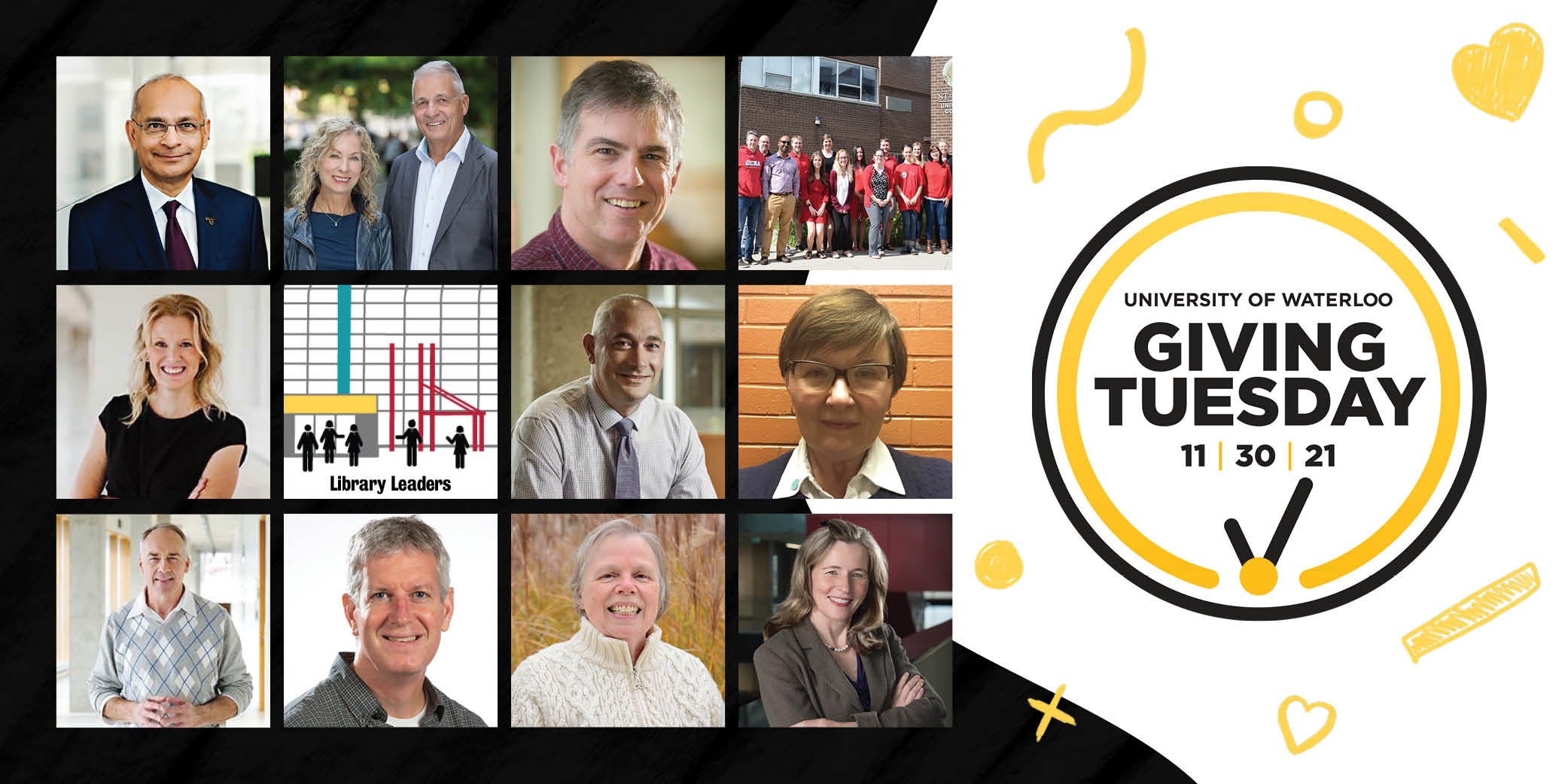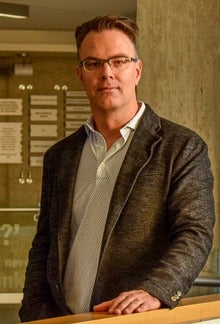- Pivot-RP: search for funding and register for training
- Tomorrow is Giving Tuesday, and Waterloo faculty, staff and retirees want you to join in the fun
- The staff computer payroll deduction program doesn't byte, we promise
- Q and A with the experts: Long COVID
- SAF professors elected co-presidents of Northern Finance Association
- Monday's notes
Editor:
Brandon Sweet
University Communications
bulletin@uwaterloo.ca
Pivot-RP: search for funding and register for training
A message from the Office of Research.
Looking for award and grant information? Pivot-RP is a searchable database of research funding opportunities for Waterloo researchers. Learn more about Pivot-RP so you can start searching for funding opportunities.
Helpful training videos can be found on the Pivot-RP YouTube channel.
Faculty members are strongly encouraged to set up an account (claim your profile) so Pivot-RP will automatically generate funding opportunities that match users’ research interests without researchers having to set up specific searches. Researchers can also use their profiles to network with other Pivot-RP users.
Three training workshops—one for faculty members and two for administrative staff—are scheduled throughout winter term. For more information about the training sessions and to register, please visit the Pivot-RP training page.
Tomorrow is Giving Tuesday, and Waterloo faculty, staff and retirees want you to join in the fun

A message from the Office of Advancement.
We want you to meet some of our Giving Tuesday challenge champions – the Waterloo leaders, faculty, staff and retirees who have generously given their charitable support to inspire others in our community to get involved. In total, 35 Giving Tuesday challenges can unlock up as much as $139,000 in additional support for Waterloo.
Check out the Giving Tuesday website to decide which challenge (or challenges!) you’ll support. Then return tomorrow to make your gift and follow along with the action in real time. See you there.
The staff computer payroll deduction program doesn't byte, we promise

A message from W Store.
Did you know that W Store offers UWaterloo regular, full-time employees the option to purchase new computers and have this purchase deducted from your pay? This is a great way to get what you need now and pay for it over time.
W Store can source many of the most popular brands, like Asus, Dell, HP and Lenovo, in addition to a variety of accessories to meet your technology needs.
If you are interested in learning more about this program, how it works and the payment options, please connect with John Jaray directly at john.jaray@uwaterloo.ca or 46389.
Q and A with the experts: Long COVID
The University of Waterloo has a number of experts available to speak about issues relating to COVID-19.

Long COVID symptoms are believed to affect about 10 per cent of those infected and can last from weeks to months. What symptoms persist in people with long COVID, and how can these be treated? Dr. Tejal Patel, a pharmacy professor at the University of Waterloo, provides answers to these and other questions.
What is long COVID?
There was a review recently published in the journal Clinical Review and a feature by the Science Table highlighting the broad range of research in this new and evolving diagnosis. Long COVID and “post-COVID-19 condition” are being used to describe the range of symptoms that can persist for weeks or months after a COVID-19 infection. We’re learning about long COVID, and different organizations define it in different ways. Here in Canada, the Public Health Agency of Canada (PHAC) has defined long COVID as symptoms that persist or recur for weeks after an acute COVID-19 infection.
PHAC further breaks long COVID into “short term,” lasting from four to 12 weeks and “long-term,” lasting longer than 12 weeks. PHAC says long COVIDsymptoms limit a person’s ability to return to baseline levels of functioning and increase the use of healthcare. Emerging research suggests long COVID can develop in those who had severe or mild COVID-19 infection and even those who were asymptomatic or did not experience any symptoms of a COVID-19 infection.
What symptoms persist in people with long COVID?
Long COVID has a wide range of symptoms that can affect different body systems. Effects on the brain can include cognitive impairment or brain fog. Heart symptoms can include chest pain and palpitations. Lung symptoms can include breathlessness, shortness of breath and cough.
Other symptoms include muscle weakness and joint pain; stomach and intestinal symptoms such as diarrhea; psychological effects like mood swings; and sensory symptoms such as changes to smell or taste. Although over 200 symptoms have been reported, the most common symptoms are fatigue or extreme tiredness. The symptoms can wax and wane, improving or worsening with time. Long COVID can have real impacts, with some people struggling to return to normal daily activities such as dressing or bathing and may not be able to take care of other family members. Others may find it difficult to work.
How common is Long COVID?
There are many different estimates for how many people have been affected with long COVID. The World Health Organization estimates that one in four people who had COVID will have symptoms for at least one-month post-infection, and one in 10 people will have symptoms for 12 weeks or more. In Ontario, 57,000 to 78,000 people are estimated to have or have had long COVID.
People who are overweight or obese, female, older, or who have a more severe COVID-19 infection appear to be at higher risk of long COVID. Vaccinations against COVID-19 reduce the risk of long COVID by reducing the likelihood of infection. Some studies indicate that people with a higher number of underlying medical conditions have greater odds of not returning to their pre-COVID-19 level of functioning.
How can long COVID be treated?
Treatment for long COVID is usually symptom-based. For example, if a person presents with symptoms related to the heart, then investigations for the specific heart-related cause will be implemented, and an appropriate treatment strategy is initiated for the specific heart-related cause. In some cases, people with long COVID will be advised to stop smoking or avoid extremes in temperature if they present with symptoms related to the lungs. People with long COVID may be asked to rest for certain symptoms, while medications may be initiated for other symptoms. Research for understanding long COVID and why so many systems are affected is ongoing. Until we have a deeper understanding that allows us to design specific treatments, treatment will be based on symptoms.
Dr. Patel is a Clinical Associate Professor in the School of Pharmacy. Dr. Patel’s research interests are in pharmacotherapeutic management of neurological conditions, in particular dementia, epilepsy and Parkinson's disease.
Her current research interests include the assessment, classification and management of drug related problems in persons presenting with cognitive impairment as well as the frail elderly in primary care settings with a particular focus on medication management capacity and adherence to medications.
SAF professors elected co-presidents of Northern Finance Association
By Patty Mah. This article was originally published on the School of Accounting and Finance website.
Two finance professors from the School of Accounting and Finance at the University of Waterloo have been elected co-presidents of the Northern Finance Association (NFA). Associate professors of finance, Blake Phillips and James Thompson were elected at the NFA annual general meeting held this past September. The NFA is a Canadian-based association of researchers in the field of finance.

Professor Phillips received his PhD in finance from the University of Alberta, where he also attained a master’s degree in forestry and an MBA in international business. Prof. Phillips is also the Co-Director of Canada’s first integrated Sustainability and Financial Management undergraduate program. He teaches undergraduate sustainability and finance courses and has research interests in wealth management and investor behaviour.

Professor Thompson received his PhD in economics from Queen’s University, where he also attained a master’s degree in economics, finance specialization. Prof. Thompson is the Co-Director of Canada’s first integrated Computing and Financial Management undergraduate program. He teaches both undergraduate and graduate finance courses with research interests in financial stability, banking, and financial contracting.
Research by both associate professors has appeared in top economics and finance journals such as Quarterly Journal of Economics, Review of Asset Pricing Studies, Journal of Banking and Finance, and Journal of Corporate Finance. Their research findings have been profiled in popular media, including the Financial Times, Bloomberg Business, The Economist, CBC News, and CTV Provincewide.
“Our organization exists to grow and spotlight finance research in Canada, where we support academics in Universities, policy institutions and industry. It is an honour to be elected to lead the organization at a time of heightened uncertainty and change, both from within our academic field, and within University education as a whole.” - James Thompson
The Northern Finance Association hosts annual meetings and conferences for finance academics, professionals, and PhD students from North America and around the world to hear and present the latest research in all areas of finance. The School of Accounting and Finance hosted this year’s virtual conference with a keynote on the need for US treasuries to be reformed presented by Darrell Duffie, a professor of finance at the Graduate School of Business at Stanford University.
Monday's notes
The Waterloo Institute for Nanotechnology (WIN) has launched a new Quantum Nano Collision (QNC) Seminar Series to deepen the engagement of the Waterloo researchers who work at the interface of quantum and nanotechnologies. This seminar series will also provide opportunities for senior graduate students, post-doctoral fellows, and research associates to present their innovative work along with the faculty members to bring together the excitement around these cutting-edge technologies that would shape our future.
"What are your questions about returning to work on campus?" asks the University of Waterloo Staff Association (UWSA). "Send them to UWSA, and then join them at the next Area Reps meeting on December 9 from 12:00 to 1:00 to hear your questions answered."
At the upcoming meeting, Marilyn Thompson, Associate Provost, Human Resources and Kate Windsor, Director of Safety will give a presentation entitled Steady State in January 2022. UWSA has set up a webform where you can anonymously enter your questions about returning to campus. Questions can be submitted up to 4:00 p.m. on Thursday, December 2.
"Your UWSA will send the questions to Thompson and Windsor a week before the Area Rep meeting so that they can compile answers to your questions," says the UWSA. "On December 9, they will answer the pre-submitted questions – and maybe take some additional live questions if we have time. If you are available, set aside the time in your calendar and join us. Everyone is welcome."
Upcoming office closure
Student Financial Services will be closed today from 10:30 a.m. and 1:00 p.m. for a staff retirement party.
Link of the day
When and Where to get support
Students can visit the Student Success Office online for supports including academic development, international student resources, immigration consulting, leadership development, exchange and study abroad, and opportunities to get involved.
Instructors looking for targeted support for developing online components for blended learning courses, transitioning remote to fully online courses, revising current online courses, and more please visit Agile Development | Centre for Extended Learning | University of Waterloo (uwaterloo.ca).
Instructors can visit the Keep Learning website to get support on adapting their teaching and learning plans for an online environment.
Course templates are available within your course in LEARN to help you build and edit your content and assignment pages quickly.
The following workshops, webinars, and events are offered by the KL team (CTE, CEL, ITMS, LIB):
- Independent Remote Course Design Essentials, self-directed, continuous self-enrollment course in LEARN.
- Independent Blended Course Design (iBlend), self-directed, ongoing
- Copyright Overview for Waterloo Instructors and Staff - self-directed, continuous self-enrollment course in LEARN.
-
Integrating PebblePad Retreat (IPR) -Setting up your Winter 2022 PebblePad Assignments and Activities (CTE 7531) - December 7, 1:00 p.m.
Employees can access resources to help them work remotely, including managing University records and privacy of personal information. Here are some tips for staying healthy while working from home.
Stay informed about COVID cases on campus by consulting the COVID case tracker.
The Writing and Communication Centre has virtual services and programs to help undergrads, grad students, postdocs and faculty members with academic writing.
- Meet with writing advisors in one-to-one appointments to brainstorm, draft, revise, and polish. No time for an appointment? Try email tutoring for undergrads.
- Beat isolation and make writing progress at weekly Virtual Writing Cafés for grad students and faculty or PJ-Friendly Writing Groups for Undergrads.
- Take an online workshop or apply to our popular Dissertation Boot Camp program.
- Faculty can request custom in-class workshops for their courses, or the WCC can facilitate any existing workshops for student groups.
Co-op students can get help finding a job and find supports to successfully work remotely, develop new skills, access wellness and career information, and contact a co-op or career advisor.
The Centre for Career Action (CCA) is offering some in-person services for fall 2021. The Tatham Centre is open with front-desk support, limited in-person appointments and co-op consults. Services are also available virtually. Book an appointment online or Live Chat with our Client Support Team. The CCA is here to help.
If you feel overwhelmed or anxious and need to talk to somebody, please contact the University’s Campus Wellness services, either Health Services or Counselling Services. You can also contact the University's Centre for Mental Health Research and Treatment. Good2Talk is a post-secondary student helpline available to all students.
While the Library continues to focus on digital resources and consultations, our spaces are open for the fall term. Dana Porter Library is open Monday to Friday, 9 a.m. to 5 p.m., and Davis Centre Library is open Monday to Friday, 9 a.m. to 11 p.m., and Saturday and Sunday, 11 a.m. to 5 p.m. for drop-in individual study space, bookable individual study rooms, drop-in access to computers and printers, book pick-up services and IST Help Desk support. Special Collections & Archives and the Geospatial Centre will be accessible by appointment. Library staff are available for questions via Ask us. Full details on current services and hours are available on the Library’s COVID-19 Update webpage.
The Faculty Association of the University of Waterloo (FAUW) continues to advocate for its members. Check out the FAUW blog for more information.
The University of Waterloo Staff Association (UWSA) continues to advocate for its members. Check out the UWSA blog for more information.
The Sexual Violence Prevention and Response Office (SVPRO) supports all members of the University of Waterloo campus community who have experienced, or been impacted, by sexual violence. This includes all students, staff, faculty and visitors on the main campus, the satellite campuses, and at the affiliated and federated Waterloo Institutes and Colleges. For support, email: svpro@uwaterloo.ca or visit the SVPRO website.
The Office of Indigenous Relations is a central hub that provides guidance, support, and resources to all Indigenous and non-Indigenous campus community members and oversees the University's Indigenization strategy.
The Waterloo Indigenous Student Centre, based at St. Paul’s University College, provides support and resources for Indigenous students, and educational outreach programs for the broader community, including lectures, and events.
WUSA supports for students:
Peer support - MATES, Glow Centre, RAISE, Women’s Centre - Visit https://wusa.ca/peersupport to book an appointment either in person or online for the Fall term!
Food Support Service food hampers are currently available from the Turnkey Desk 24/7 in the Student Life Centre. Drop off locations are also open again in SLC, DC, DP, SCH and all residences.
Co-op Connection all available online. Check https://wusa.ca for more details.
Centre for Academic Policy Support - CAPS is here to assist Waterloo undergraduates throughout their experience in navigating academic policy in the instances of filing petitions, grievances and appeals. Please contact them at caps@wusa.ca. More information is available.
WUSA Student Legal Protection Program- Seeking legal counsel can be intimidating, especially if it’s your first time facing a legal issue. The legal assistance helpline provides quick access to legal advice in any area of law, including criminal. Just call 1-833-202-4571.
Empower Me is a confidential mental health and wellness service that connects students with qualified counsellors 24/7. They can be reached at 1-833-628-5589.
When and Where (but mostly when)
Healthy Warriors at Home (Online Fitness).
Warriors vs. Laurier Blood Donation Battle. Join your fellow Warriors, donate blood and help us win the Blood Battle against Laurier for a second year in a row. Set up a profile or add the PFL code: UNIV960995 to your account if you have a blood.ca account already. Questions? Contact WarriorsInfo@uwaterloo.ca.
Drop-in to Warrior Virtual Study Halls on Wednesdays from 5:30 p.m. to 7:00 p.m. Come together in this virtual space to set goals and work independently or in groups each week.
Renison English Language Institute continues to offer virtual events and workshops to help students practice their English language skills.
Quantum Nano Collision Seminar Series: Professor Na Young Kim, Monday, November 29, 4:00 p.m.
WaterLeadership: Improving Bibliometrics for Early Career Researchers, presented by Laura Bredahl, Tuesday, November 30, 1:00 p.m.
Quantum Valley Investments® Problem Pitch Finals, Tuesday, November 30, 7:00 p.m., Zoom.
W3+ presents Shop & Plan Meals Like a Dietitian, Wednesday, December 1, 12 noon to 1:00 p.m., online.
CPI Talk - Data Breaches and Multiple Points to Stop Them, Wednesday, December 1, 6:00 p.m.
Indigenous Speakers Series presents Jean Teillet, Thursday, December 2, 12 noon.
Decolonizing Qualitative Approaches, Thursday, December 2, 12 noon to 1:30 p.m.
‘It Takes a Village’: Mentorship in Health, Sport, and Leisure Studies, virtual Hallman Lecture Friday, December 3, 1:00 p.m. to 2:30 p.m. by Shaw-Mannell Leisure Research Award recipient for 2021, Dr. Lucie Thibault, Professor and Dean of Faculty of Health Sciences, University of Ottawa.
International Day of Persons with Disabilities keynote event featuring Chris Downey, Friday, December 3, 1:30 p.m. to 2:30 p.m. Register through Portal.
NEW - UWSA presents Steady State Q&A, Thursday, December 9, 12 noon until 1:00 p.m., via Teams. Submissions (webform) will be accepted until 4:00 p.m. on Thursday, December 2.